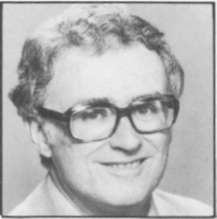 |
Home | Search | Browse | About IPO | Staff | Links |
 |
Home | Search | Browse | About IPO | Staff | Links |
|
Chicago Polovchak case ends; issues unresolved  By ED MCMANUS IT WAS a story that captivated the nation. The 12-year-old boy, who immigrated to Chicago from the Soviet Union with his family, had resisted returning there when his parents became disenchanted with life in America. The matter was taken to court, and there it stayed for more than five years -moving from one court to another, appealed and briefed and remanded and appealed and remanded and so forth. Itprobably would have continued on this merry-go-round for another five years, but an event intervened that made the whole thing moot: The boy turned 18. The boy, of course, was Walter Polovchak, and his case presented one of those classic issues which give judges gray hairs: pitting one constitutional right against another and forcing a delicate weighing process to resolve the dispute. Lawyers for Walter's parents contended they had the right to keep their family intact; lawyers for Walter said his wishes should be respected, There was no easy answer. In July 1980, Walter ran away from his parents to live with a cousin, and the Cook County Juvenile Court convended a hearing to determine his status, His father, Michael, appeared at the hearing, but without either a lawyer or an interpreter, and the court declared Walter a ward of the state. The next day, the American Civil Liberties Union (ACLU) agreed to represent Michael Polovchak and his wife Anna, and the protracted court battle began. A lot of people were sympathetic to Walter. People who would in any other circumstance come down in favor of parental rights quickly rallied to his defense, and the reason was their strong feeling against the Soviet Union. If the Statue of Liberty means anything, they argued, it means that America will provide refuge to the oppressed, regardless of race, color or creed ... or age, I guess. If Walter's parents don't like it here and want to go back to Russia, they said, let them go ahead, but we have an obligation to listen to Walter when he says he likes it here and doesn't want to go back. The other point of view was that he was just a kid. At 12 years old, was he really capable of making such an important decision? What if this happened to an American family in the Soviet Union? What if it happened to a Chicago family that wanted to move to Kalamazoo? Don't parents have rights? I don't pretend to know the answer, but it seems to me that both sides are right — in the sense that both kids and parents have rights. Generally, parents have a right, a fundamental right, to run their family. The state may interfere only for good cause — specificially, to protect the children. And normally, by "protect," we mean protect from physical harm by abuse or neglect. Furthermore, even in cases of alleged abuse or neglect, the parents have an absolute right to a fair hearing. . . . people got emotional and the rights of On the other hand, kids have rights. A judge isn't going to pay much attention to a 5-year-old, but by 12 a child has common sense, and courts in divorce custody cases, for instance, frequently take into consideration the wishes of the children. Once a child is 17, even more weight ought to be given to his desires. That's the thrust of the opinion issued in September by the U.S. Seventh Circuit Court of Appeals — the last Walter Polovchak decision: Both sides need to be considered. The court sent the case back to the U.S. District Court with instructions to "give close attention to the weighty parental interests of the senior Polovchaks, who have been deprived of the nurture and education of their son by a process which, for all practical purposes, has ignored them." But the circuit court said the lower court would also "have to consider conscientiously Walter's interest in avoiding the sanctions often imposed by the Soviet state to those who left it and in effect publicly criticized it." Three weeks later, Walter celebrated his birthday, so the district court didn't get a chance to reconsider the case. Along the way, the ACLU got a lot of flak for defending Michael and Anna Polovchak, even from some of its own members. The ACLU's position was that the government had failed to show that the Polovchaks were bad parents and had totally failed to follow proper procedures, either in the juvenile court or at a subsequent immigration hearing in which Walter was summarily granted asylum. As with so many civil liberties issues, people got emotional and the rights of the parents were buried under an avalanche of support for the idea of saving the child from a life behind the Iron Curtain. From the parochial point of view of patriotic Americans, saving the child was paramount. But the ACLU lawyers just look at the Constitution. No matter what, they say, you can't throw out the rules. Maybe it's just as well that the case dragged on as long as it did. Aside from the procedural issue, I was never able to decide in my own mind where Walter should have been told to live. Time, it turns out, decided the issue — and got both me and the court off the hook. January 1986/IIlinois Issues/35 |
|
|